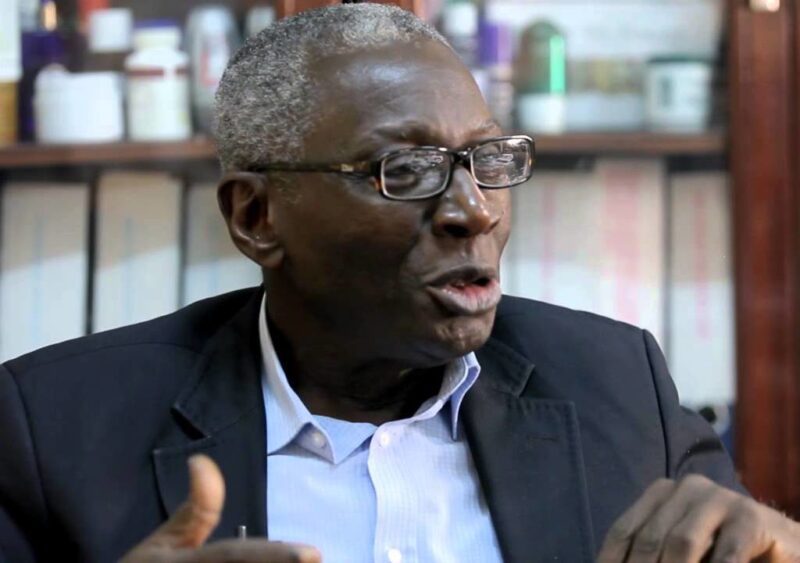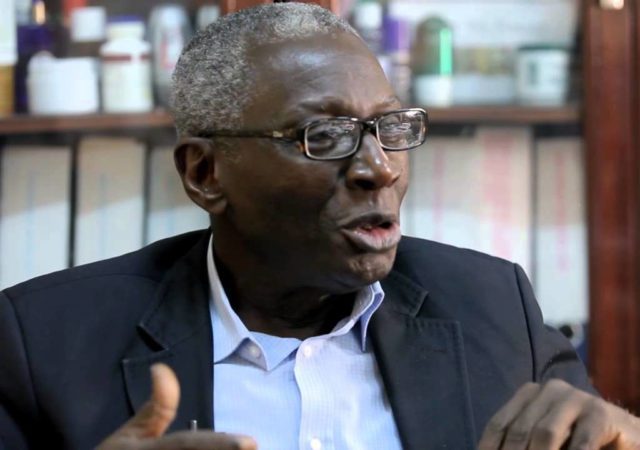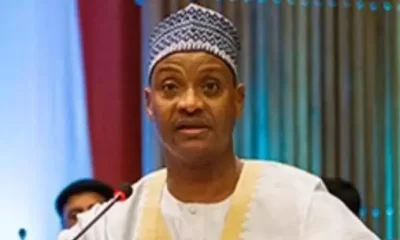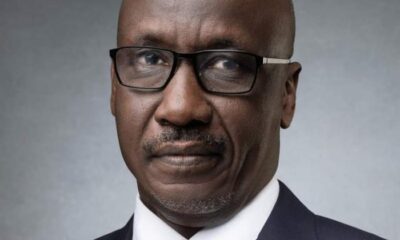Economic Issues
Economy: Kaleidoscope of recent media reports -By Henry Boyo


Henry Boyo
I was reading a story recently that there was (an) SME intervention fund in the CBN that was grossly under-utilised. Why should that be when we have a lot of SMEs looking for funds to develop products? If we want to assist the SME, we must make sure that interest rate on their loans is not more than five per cent. That is why Lagos State has used the benchmark of three per cent interest rate for the SMEs …”
“Yes, (the) CBN should bring down the Monetary Policy Rate for the benefit of the SME operators… If we are talking of diversification, the key lies in that sub-sector.”
An excerpt from an interview with the Lagos State Commissioner of Commerce and Industry, Rotimi Ogunleye, “Double digit interest rate not good for MSME operators” in Vanguard, May 30, 2016.
“The aggregate bid amount by manufacturers under the former exchange rate of N197=$1 was N827.4bn, but the amount they were asked to pay based on the new rate was N1.176tn. Thus, the manufacturers were required to come up with the difference of N348.6bn.”
“Some manufacturers have expressed discontent about the development, adding that they did not incur the losses in the course of doing business, but that they arose as a result of a government policy.”
“They said more job losses and company closures would be the consequence of making them to pay the difference between the old and new exchange rate.”
Confirming the story, the President, Manufacturers Association of Nigeria, Dr. Frank Jacobs, said manufacturing firms had been sacking workers massively across the nation. Jacobs, however, said the forex situation had improved…”
The Director-General, Lagos Chamber of Commerce and Industry, Mr. Muda Yusuf, agreed that “the new forex policy meant significant shocks to investors who had mature LCs awaiting remittances and were caught up in the policy change. These include those who have high foreign debt exposures.
“It is, therefore, desirable to cushion the effects of these shocks on the companies, because of the wider implications on the economy, on job creation and retention as well as on non-performing loans, which may escalate, given the exposure of the banks to these companies.” See “Manufacturers lose N348.6bn to new forex policy” in The PUNCH, July 4, 2016.
“Traders expecting Nigeria’s currency devaluation to trigger a rush of cash into Africa’s largest economy are rapidly concluding that the naira’s 30 per cent drop wasn’t enough,” reports Bloomberg; “Investors got the foreign-exchange policy change they asked for; but still aren’t flocking to buy Naira assets as the CBN still keeps a grip on its currency, after abandoning a 16-month-old peg.”
According to Rick Harrell, an investment analyst with Loomis Sayles, which oversees $229 billion of assets in Boston, “the fundamental backdrop isn’t positive. Buhari told businessmen in Abuja, on June 27, that he didn’t understand the “ruthless devaluation”. He had previously likened devaluation to “murder.”
Traders on the forwards market are betting the naira will drop to N293=$1 in three months and N328 next year. The end of the peg has failed to ignite a rally in Nigerian stocks. “For me to get started, I’d want yields of 16 per cent or higher on government debt,” Rick Harrell insisted.
Furthermore, Nicholas Spiro, a partner at London-based Lauressa Advisory Ltd., expects consumer inflation will probably accelerate in the short term as the devaluation increases the cost of imports such as petrol, while oil production has dropped close to a 20-year low…” See “Traders not satisfied with naira’s 30% drop after new fx policy kick-off” in Daily Independent 30/06/16.
“The National President of the Association of Nigeria Licensed Customs Agents, Olayiwola Shittu, said although devaluation was expected to instigate higher import bills, he called on the NCS to be transparent with the process.” See, “New forex policy raises import duty by 43%” in The PUNCH, July 6, 2016.
“The price of kerosene has risen to as much as N300/litre and much more on the black market, with many depots in Lagos not loading the product.
Our correspondent gathered that the supply of kerosene by the NNPC through its subsidiary, PPMC, has reduced in recent weeks. Out of 36 depots surveyed in Apapa, only one, INDEX, was loading dual purpose kerosene as of Friday.
The Lagos Zone, NUPENG chairman, Alhaji Tokunbo Korodo, noted that, “the price hike is not only on kerosene; it is also affecting diesel. Diesel is now being sold at between N185 and N200/litre as against N105-N110. Korodo expects the prices of kerosene and diesel to continue to rise if they were not being supplied from the PPMC depots. He said some of the marketers had refused to get involved in kerosene importation because of foreign exchange constraints.” See “Kerosene soars to N300/litre as supply drops” in The PUNCH, July 6, 2016.
“The Nigerian Civil Aviation Authority has warned all airlines selling flight tickets in foreign currencies in Nigeria to desist from the practice forthwith… as such practices contravened the CBN’s guidelines on the pricing of products /services in Nigeria. The NCAA is disturbed by reports that some foreign airlines are declining to accept the “naira” as payment for tickets.” See, “Stop selling tickets in foreign currencies, NCAA warns airlines”, in Daily Independent, July 4, 2016.
“However, the CBN’s new forex regime has rather served as early catalyst to edge up prices of goods; especially affected are imported goods.”
An official of the National Bureau of Statistics observed that “…Our last report which showed rise in headline inflation is a pointer to an increasingly deplorable situation,” he said.
“Factories are closed because of lack of raw materials and power. The consequence is loss of jobs… So expect rise in inflation particularly, when the Customs Service have also keyed into the new FX regime. It is not as if importers have easy access to FX now, they still struggle. It is by extension a general crisis. The liquidity crisis that manifested in Skye Bank is also affecting other banks,” the NBS official concluded.” See “New customs duty may push inflation above 18%” in Daily Independent, July 7, 2016.
“At least 226 ongoing Federal Government road projects across the country are likely to suffer a major setback as the huge contract sum of N2tn required for their completion has lessened in value due to the current forex crisis.”
The President, Federation of Construction Industry, Mr. Solomon Ogunbusola, noted that the forex crisis is “affecting contractors because the contracts some of us got when the dollar was between N170 and N180 have not been completed and right now, a dollar goes for over N300. Basically, the contract sum has reduced in value by half.” See “Forex crisis threatens FG’s N2tn road projects” in The PUNCH, July 9, 2016.
“In the country’s debt management strategy document for 2016-2019, the DMO stated, “…Regarding domestic debt, the large amount of short-term securities in the portfolio implies a relatively higher exposure to an interest rate increase and additional high refinancing risk.” See, “FG spends N446bn to service debt in four months” in The PUNCH, July 7, 2016.
“A Non-Governmental Organisation specialising in public debt and social welfare, social action, has condemned the Federal Government’s plan to borrow $7.8bn to finance the 2016 budget deficit of N2.2tn. The Abuja Head of Social Action, Vivian Bellonwu-Okafor said, “The DMO’s so-called Borrowing Plan 2016-2019… is shallow, vague and does not make effective room for monitoring as it does not definitively tie credit facility to any specific measurable project.
This is contrary to the provisions of Section 41(1) of the Fiscal Responsibility Act 2007. The borrowing plan, as it is, will frustrate any oversight effort by the legislature or monitoring by citizens or civic groups.” See “Group condemns FG’s borrowing plan” in The PUNCH, July 7, 2016.













![The EU is punishing Turkey for an operation that it felt forced to embark on as a result of their own questionable decision to partner with the YPG in the fight against ISIL, writes Bakeer [Reuters]](https://www.opinionnigeria.com/wp-content/uploads/2019/10/The-EU-is-punishing-Turkey-for-an-operation-that-it-felt-forced-to-embark-on-as-a-result-of-their-own-questionable-decision-to-partner-with-the-YPG-in-the-fight-against-ISIL-writes-Bakeer-80x80.jpg)




